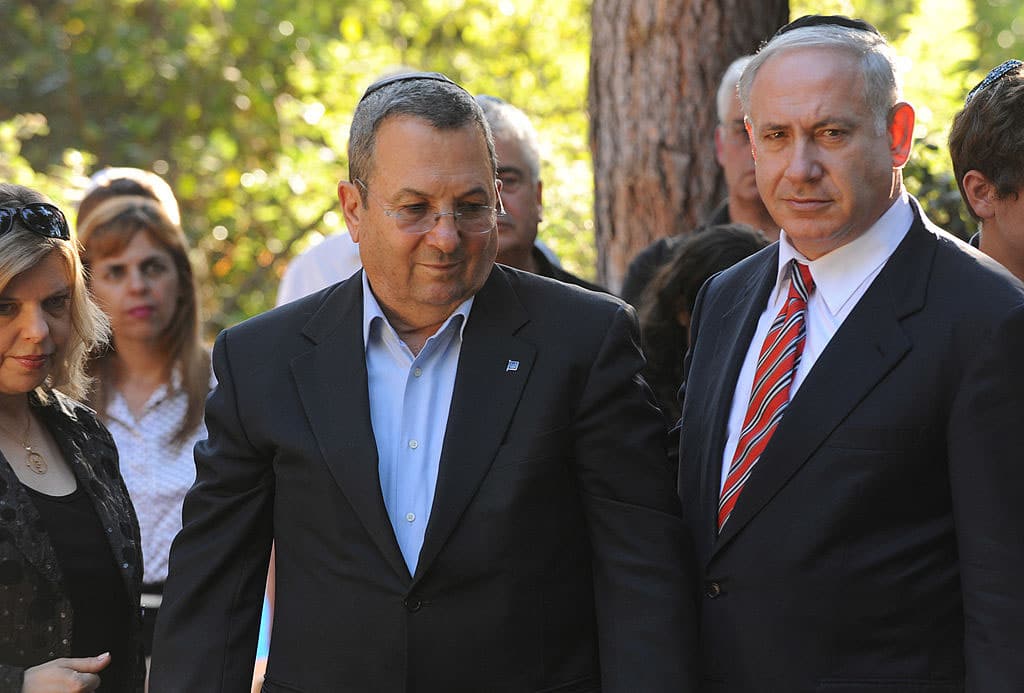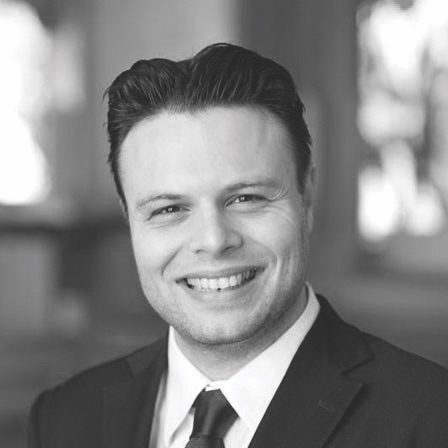 Israel’s Prime Minister Benjamin Netanyahu (R) and Israel’s Defense Minister Ehud Barak attend a memorial ceremony to Yoni Netanyahu in the military cemetery in Mt. Hertzel, June 28, 2009 in Jerusalem, Israel. (Photo by Ahikam Seri – Pool/Getty Images)
Israel’s Prime Minister Benjamin Netanyahu (R) and Israel’s Defense Minister Ehud Barak attend a memorial ceremony to Yoni Netanyahu in the military cemetery in Mt. Hertzel, June 28, 2009 in Jerusalem, Israel. (Photo by Ahikam Seri – Pool/Getty Images) Throughout my life, I have been privileged to meet with three Israeli prime ministers. One of them was Ehud Barak. As I sat down with PM Barak, the first thing I told him was that his eulogy of Yoni Netanyahu, the sole Israeli soldier who died during the raid on Entebbe in 1976, is, in my eyes, one of the greatest Jewish eulogies of the twentieth century. Visibly moved, Barak thanked me for these words.
In his eulogy of Yoni Netanyahu, Barak spoke about belonging to a generation that lived during both the Holocaust and our people’s astounding political resurrection in Israel only three years thereafter. The sheer density of these events, professed Barak, is existentially overwhelming and historically overbearing.
Barak’s eulogy of Netanyahu also drew an analogy between the biological and the political. Barak spoke about how numerous cells in the human body die out throughout the years to preserve the individual human body writ large. In the body politic as well, discerned Barak, the survival of the nation-state necessitates the death of some of its individual members — the soldiers who give up their lives — to enable the survival of the State of Israel.
There is, however, a crucial difference between the cells that organically die and the soldiers who are willing to give up their lives for the preservation of the body politic, observed Barak. For the soldiers who knowingly put their lives in harm’s way are well aware of the prospective risk of perdition, whereas the biological cells in the human body are neither conscious nor choosing to embrace their sacrificial role.
Barak then went on to note that ever since the dawn of Jewish history, from the days of Jonathan the Maccabi in the second century BCE all the way to the days of Jonathan Netanyahu some two millennia thereafter, the preservation of Jewish sovereignty in Israel always hinged upon the sacrificing spirit of a mere handful of altruistic warriors.
Barak also alluded to the profound existential rift inherent in Yoni Netanyahu’s poetic soul. Specifically, Yoni’s underlying inner struggle to balance his Zionist ideals with his “amor intellectualis” — his insatiable love of learning and scholarship at Harvard University.
Yoni Netanyahu died during the opening minutes of the raid on Entebbe, the most audacious and spectacular military raid in the history of modern warfare. And the success of this daring operation, observed Barak, necessitated a delicate balance between vision and detail. On one hand, the people who planned the Entebbe raid needed to conceptualize boldly and “fantasize” about how to bring home Jewish civilians who were held hostage in Africa, thousands of miles away from Israel. On the other hand, the planners of the mission also needed to remain grounded regarding the material and the logistical aspects of the raid.
This precarious balance between vision and detail, between macro and micro, between the pathos and poetry of vision and the somber prose of everyday life is exactly what the Torah expects from us as individuals as we construct our own personal life stories. We are called upon to live with a sense of destiny and vocation while remaining entrenched and grounded in the nitty-gritty of what philosopher Heidegger disparagingly called “everyday-ness” — the monotonous exigencies of practical everyday living.
This precarious balance between macro and micro is exactly what the Torah expects from us as individuals.
And this is all reflected, the Chassidic masters inform us, in the title of this Shabbat’s two Torah portions: “Vayakhel-Pikudey,” which are almost always juxtaposed and read together during the same Shabbat. “Vayakhel” means “to assemble,” to gather everyone to articulate the “big picture” of what our human endeavors and strivings are all about, whereas “Pikudei” discusses the minutiae of raw materials and subtle planning required to bring a worthy and sublime vision into actuality.
The book of Proverbs reminds us that “in the absence of vision, a people withers away.” The same holds true with regard to our own individual lives. Just like the planners and executors of the legendary raid on Entebbe, which symbolizes the very essence of the Zionist ideal, so too are we, as solitary individuals, also summoned and ordained, from on High and from within, to master this elusive dance of formulating a compelling existential vision on the one hand, and meeting with vigor life’s innumerable quotidian demands, on the other hand.
May we achieve just that, and find truth and lovingkindness in the eyes of God and humanity, Amen.
Rabbi Tal Sessler, Ph.D., is the author of four books in philosophy and contemporary Jewish identity. He is the Senior Rabbi of Sephardic Temple Tifereth Israel, and the incoming Dean of the Rabbinical School at the Academy for Jewish Religion in California, where he also teaches Jewish philosophy.























 More news and opinions than at a Shabbat dinner, right in your inbox.
More news and opinions than at a Shabbat dinner, right in your inbox.